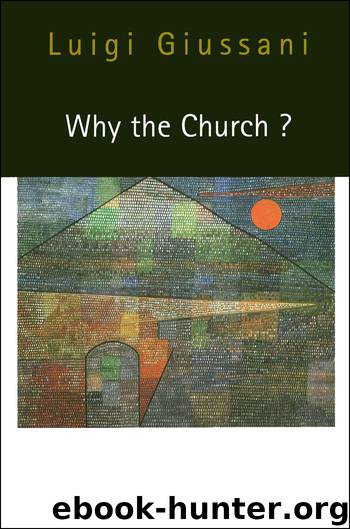Why the Church? by Luigi Giussani

Author:Luigi Giussani [Giussani, Luigi]
Language: eng
Format: epub
Publisher: MQUP
Published: 2001-03-01T16:00:00+00:00
c) By Means of the Era and the Historico-Cultural Environment
Man is conditioned by the historico-cultural era in which the affair of his earthly life unfolds, and by the environment of which he is a part. Because he lives his Christianity in this fabric of variegated needs, stimuli, great things, and worries, the values the Church presents will, from era to era, bear the features of the limitations and the characteristics of the particular vision of life of the moment. The most concise of Paul’s epistle, known as the Letter to Philemon, is particularly significant in this respect. It is “a short note addressed to a Christian, Philemon, the master of a fugitive slave, Onesimus. The apostle took Onesimus under his wing and is now sending him back to Philemon with a recommendation that he be treated as a beloved brother; the note was written during Paul’s imprisonment and was probably sent to Colossae.”16 This short “letter of reference” focusses on an issue of interest to our own reflection here: the attitude of the first Christians to slavery. Paul sends Onesimus back to Philemon, whose slave Onesimus was. Paul probably knew this wealthy gentleman and had probably converted him. In the letter, he does not tell him that since it can be deduced from Jesus’ teaching that all men are equal, Onesimus must no longer be his slave. Why not? Because as children of their time, as Philemon and Onesimus were, “slavery is an accepted fact which in this instance, does not constitute a problem. It falls within the framework of the established social order, although it is obviously not the best of orders.”17 So even though Paul seems to be subject to the social conditioning of the time, he nevertheless, expresses a belief in the value of the person, asking the master to welcome back the fugitive slave and telling him that all this happened “so that you could have him back for ever, no longer as a slave, but something much better than a slave, a dear brother. … So if you grant me any fellowship with yourself, welcome him as you would me” (Phil. 15b–17).
The true innovation… lies in the new relationship which slave and master have with God, and which transforms the common slavery, perchance, of the human condition into rational devotion to a God who frees all those who serve him for love. This concept was liable to clash with the arrogance of a proud society (which had also been irritated by the declarations of the pagan Roman, Seneca) but it was not in conflict with Roman law…. For unlike classical Greek philosophy, Roman law acknowledged that a slave could be potentially equal to his master, and granted slaves citizenship as soon as they became freemen.18
It must be understood that Christianity is not in the world to hollow out the dynamic of historical evolution. Rather, its purpose is to communicate certain values, such as the value of the person, and if these values are preserved, then every evolution has the means to become more useful as an expression of man.
Download
This site does not store any files on its server. We only index and link to content provided by other sites. Please contact the content providers to delete copyright contents if any and email us, we'll remove relevant links or contents immediately.
| Anthropology | Archaeology |
| Philosophy | Politics & Government |
| Social Sciences | Sociology |
| Women's Studies |
Nudge - Improving Decisions about Health, Wealth, and Happiness by Thaler Sunstein(7689)
The Fire Next Time by James Baldwin(5421)
iGen by Jean M. Twenge(5403)
Adulting by Kelly Williams Brown(4561)
The Sports Rules Book by Human Kinetics(4377)
The Hacking of the American Mind by Robert H. Lustig(4368)
The Ethical Slut by Janet W. Hardy(4236)
Captivate by Vanessa Van Edwards(3835)
Mummy Knew by Lisa James(3680)
In a Sunburned Country by Bill Bryson(3528)
The Worm at the Core by Sheldon Solomon(3483)
Ants Among Elephants by Sujatha Gidla(3458)
The 48 laws of power by Robert Greene & Joost Elffers(3219)
Suicide: A Study in Sociology by Emile Durkheim(3009)
The Slow Fix: Solve Problems, Work Smarter, and Live Better In a World Addicted to Speed by Carl Honore(3001)
The Tipping Point by Malcolm Gladwell(2907)
Humans of New York by Brandon Stanton(2864)
Handbook of Forensic Sociology and Psychology by Stephen J. Morewitz & Mark L. Goldstein(2691)
The Happy Hooker by Xaviera Hollander(2682)
